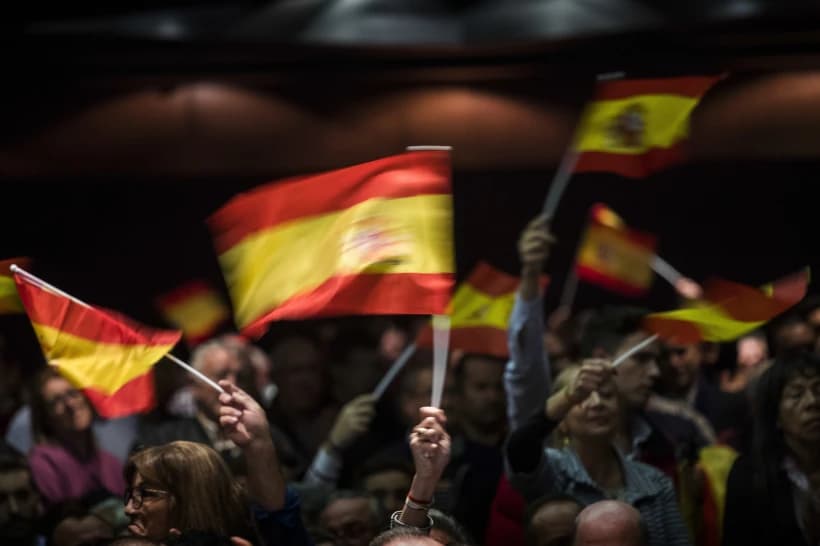BARCELONA, Spain – The leader of Vox, the far-right party in Spain, has accused the Spanish bishops of being neutered by government grants and the fallout from the sexual abuse crisis.
The row erupted following the decision of the city council in Jumilla, Murcia, to pass a motion on July 28 that allows for the banning of Islamic festivities in the town, in particular the collective prayer with which the Muslim community celebrates the end of Ramadan and the “Feast of the Lamb.”
The motion was originally proposed by Vox, but amended by the party in charge of the council, the conservative PP (Popular Party).
On August 8, the Spanish Bishops’ Conference released a statement on the decision, saying that “imposing such restrictions for religious reasons constitutes discrimination that has no place in democratic societies.”
“Limiting these rights violates the fundamental rights of every human being, and it affects not just one religious group but all religious denominations, as well as nonbelievers,” the statement added.
The Spanish bishops argued that both the Spanish constitution and the Declaration of Human Rights enshrine religious freedom.
It was this intervention that aroused the ire of Santiago Abascal, leader of Vox.
Speaking on Bipartidismo Stream, a rightwing YouTube channel, Abascal was vociferous in his criticism of the Spanish ecclesial hierarchy, not just on the Jumilla case, but also on their position on immigration, their silence on what he called “advancing Islamist extremism,” and the Church’s role in the controversy surrounding the removal of Francoist symbols in the Valley of the Fallen.
Abascal echoed the comments made by JD Vance earlier this year when he said the U.S. bishops’ conference criticism of Trump’s immigration policies were motivated by money.
“I don’t know what this is due to. I don’t know if it’s due to the public revenue the Church receives, which makes it difficult for it to combat certain government policies,” he said.
“I don’t know if this weakness or this silence refers to the revenue received as a result of the system of aid for illegal immigration, where probably not all the money goes to those supposedly needy people [immigrants] but also to the support of structures of the Church,” he said.
“I don’t know if it has to do with the cases of pedophilia within the Church, which have left it absolutely muzzled by the actions of certain liberticidal governments that go against our identity, even against religious freedom and faith in many cases. I don’t know why, but I am perplexed by these positions,” Abascal added.
This unprecedented attack is the first time Abascal has criticized the episcopal hierarchy in such a fashion as he is aware that many of his voters are Catholic.
In the past he has made his views known on Pope Francis who he disagreed with on immigration and referred to as “citizen Bergoglio.”
The Church in Spain is currently fighting a fierce, at times public, battle with the Spanish government in regard to how best compensate victims of sexual abuse which Abascal didn’t mention.
The motion in Jumilla that has caused such controversy asks the council to have regulations on the use of municipal sports facilities so that they are used “exclusively” for activities organized by the City Council and “in no case for cultural, social, or religious activities unrelated to the City Council.”
Furthermore, it also urges the “governing team to promote activities, campaigns, and cultural proposals that defend our [Spanish] identity and protect traditional religious values and manifestations in Spain.”
In practice, this would mean the Islamic celebrations that happen in the city are banned. The original Vox motion outright called for a ban on “The Feast of the Lamb” and “other similar commemorations alien to our traditions.”
Walid Habbal, coordinator of the Islamic Commission of the Region of Murcia, called the motion a “step backward” and said “the city council should have engaged in dialogue and sought alternatives, which is the most reasonable and intelligent thing to do, but that’s not how things are done, especially after Torre Pacheco”.
The mention of Torre Pacheco refers to anti-migrant riots in July, also in Murcia, following the beating of an elderly man and the arrest of three men of North African origins.
The Spanish government, currently led by Pedro Sanchez’s socialist PSOE (Spanish Socialist Workers’ Party), on August 10, ordered officials to scrap the ban, describing it as a “discriminatory” measure that will impinge on the religious freedom of Muslims in the region – there are an estimated 146,000 Muslims in Murcia.
Additionally, on Monday a central government representative said the council in Jumilla had a month to formally respond to Madrid’s request. The spokesperson added that if they didn’t respond, the government would explore other legal options.
This article has been corrected.













